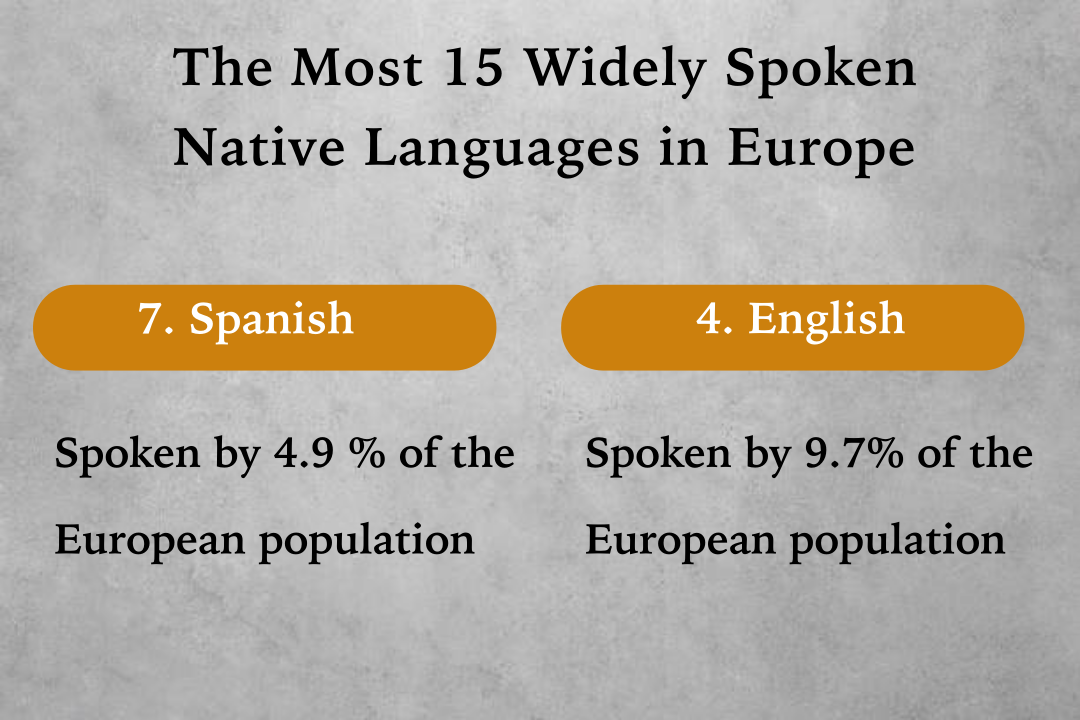Europe is a continent known for its rich linguistic diversity, with a multitude of languages spoken across its various regions. While many European countries have adopted English as a second language, native languages still play a significant role in shaping the continent’s cultural and linguistic landscape.
Thank you for reading this post, don't forget to subscribe!Europe is comprised of 52 nations, encompassing a total land area spanning ten million square kilometers (equivalent to four million square miles), which constitutes approximately 6.6% of the world’s habitable surface. The coastlines of Europe extend for a combined length of 112,483 kilometers (or 69,909 miles). With a population of approximately 728.12 million residents, Europe represents 9.2% of the global population and contributes significantly to the world economy, accounting for roughly 24% of the total global economic output.
In this article, we will explore the most widely spoken native languages in Europe, shedding light on their prevalence and influence within the region.
1. Russian (19.4% – 141.4 Million Population)

At the top of the list is Russian, spoken by approximately 19.4% of the European population, with a staggering 141.4 million native speakers. Russian’s dominance is primarily attributed to the vast expanse of Russia itself, which stretches from Eastern Europe to Northern Asia. As a result, Russian holds the title of the most widely spoken native language in Europe.
2. German (12.7% – 92.5 Million Population)

German takes the second spot, with 12.7% of Europeans, or 92.5 million people, considering it their mother tongue. This is due to Germany’s central position in Europe and its economic and political significance. German is also spoken in Austria, Switzerland, Luxembourg, and parts of Belgium, making it one of the continent’s most influential languages.
3. French (9.7% – 70.6 Million Population)

French, with 9.7% of the population, or 70.6 million speakers, is the third most widely spoken native language in Europe. France, Belgium, Switzerland, and several African nations have French as an official language, contributing to its prominence in Europe.
4. English (9.7% – 70.4 Million Population)

Although English is an official language in the United Kingdom and Ireland, it is also widely spoken across Europe. It claims the same percentage of speakers as French, with 70.4 million people considering it their native tongue. English’s global influence, driven by the United Kingdom’s colonial history, has made it a lingua franca in many European countries.
5. Italian (7.9% – 57.3 Million Population)

Italian is the fifth most spoken native language in Europe, with 7.9% of the population, or 57.3 million speakers. Italy’s rich cultural heritage, renowned cuisine, and historical significance contribute to the continued prevalence of Italian within the continent.
See Also: The Top 10 Most Endangered Languages in Europe
The 20 European countries with the best English accent
6. Polish (5.1% – 37.3 Million Population)

Polish claims the sixth spot, with 5.1% of Europeans, or 37.3 million people, as native speakers. Poland’s location in Central Europe and its status as a member of the European Union have further solidified the importance of the Polish language.
7. Spanish (4.9% – 35.7 Million Population)

Spanish, with 4.9% of the population, or 35.7 million speakers, is widely spoken in Spain, as well as in Latin American countries. This dual influence has ensured Spanish remains a prominent language in Europe.
8. Ukrainian (3.7% – 27.0 Million Population)

Ukrainian holds the eighth position, with 3.7% of Europeans, or 27.0 million people, considering it their mother tongue. Ukraine’s pivotal role in Eastern Europe contributes to the prevalence of Ukrainian in the region.
9. Dutch (3.2% – 23.2 Million Population)
Dutch, spoken by 3.2% of the population, or 23.2 million speakers, is the official language of the Netherlands and Belgium. Its importance in Europe is underscored by the economic prowess of these countries.
10. Romanian (2.3% – 16.9 Million Population)

Romanian, with 2.3% of Europeans, or 16.9 million speakers, is the native language of Romania and is also spoken in parts of Moldova. Romania’s historical ties to Eastern Europe make Romanian a significant language in the region.
11. Portuguese (1.6% – 11.3 Million Population)

Portuguese is spoken by 1.6% of the European population, accounting for 11.3 million native speakers. Portugal, as well as parts of Spain, have Portuguese as their official language.
12. Greek (1.5% – 10.7 Million Population)

Greek is the native language of 1.5% of Europeans, with 10.7 million speakers. Greece’s cultural and historical significance has ensured the continued prominence of the Greek language.
13. Hungarian (1.4% – 10.3 Million Population)

Hungarian is spoken by 1.4% of the European population, comprising 10.3 million native speakers. Hungary’s central location in Europe has contributed to the prevalence of the Hungarian language.
14. Swedish (1.3% – 9.8 Million Population)

Swedish claims 1.3% of Europeans as native speakers, with 9.8 million people considering it their mother tongue. Sweden’s influence extends beyond its borders, making Swedish an important language in the region.
15. Czech (1.2% – 8.5 Million Population)

Czech is spoken by 1.2% of the population, with 8.5 million speakers in Europe. The Czech Republic’s location in Central Europe has solidified the importance of the Czech language within the region.
Europe’s linguistic tapestry is a testament to its rich history and cultural diversity. The most widely spoken native languages in Europe encompass a wide range of linguistic traditions and have played a pivotal role in shaping the continent’s identity. As Europe continues to evolve, so too will its linguistic landscape, reflecting the dynamic and interconnected nature of the continent.
Reference: www.worddata.info







